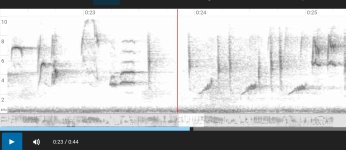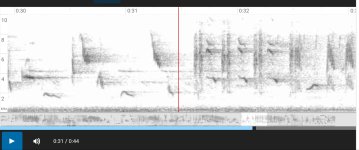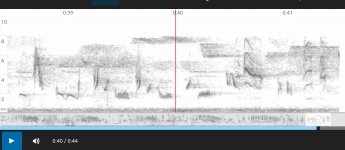-
Welcome to BirdForum, the internet's largest birding community with thousands of members from all over the world. The forums are dedicated to wild birds, birding, binoculars and equipment and all that goes with it.
Please register for an account to take part in the discussions in the forum, post your pictures in the gallery and more.
You are using an out of date browser. It may not display this or other websites correctly.
You should upgrade or use an alternative browser.
You should upgrade or use an alternative browser.
Can you confirm Marsh Warbler song in France ? (1 Viewer)
- Thread starter Valéry Schollaert
- Start date
More options
Who Replied?Valéry Schollaert
Respect animals, don't eat or wear their body or s
These applications don't have a good level. I hope they will never.
Alexander Stöhr
Well-known member
Hello Valéry,
interesting recording. Tfs!
yes, quite fast and hurried speed and much imitations (including many Common Nightingale phrases and more) gives this bird a Marsh Warbler vibe for me too. But many Marsh Warblers are still more exploding and hurried than this, so - taken location into account - I think its a Melodious Warbler.
The other option I can think of, is a Blackcap. I have heard them appearantly imitating Nightingale (or its style) so good that I had to listen to the bird for long or even see it to be sure of its identity.
No offence you know: for your other question: yes, the thought that an AI bird-identification tool becomes nearly infallible seems at first gruesome (gruselig says google translate) for me too. But some benefits immediately come into my mind:
interesting recording. Tfs!
yes, quite fast and hurried speed and much imitations (including many Common Nightingale phrases and more) gives this bird a Marsh Warbler vibe for me too. But many Marsh Warblers are still more exploding and hurried than this, so - taken location into account - I think its a Melodious Warbler.
The other option I can think of, is a Blackcap. I have heard them appearantly imitating Nightingale (or its style) so good that I had to listen to the bird for long or even see it to be sure of its identity.
No offence you know: for your other question: yes, the thought that an AI bird-identification tool becomes nearly infallible seems at first gruesome (gruselig says google translate) for me too. But some benefits immediately come into my mind:
- Sound ID Reckahn NE-Germany from today =Bump! With thanks to 01101001 and Indobider once more!
- https://www.zdf.de/kinder/loewenzahn look at the young "Nightingales" in the middle of the video
Dutchbirder64
Well-known member

I am really in doubt here. I am missing the Acro type song of a Marsh Warbler but they are very variable. And a Melodious Warbler is mostly high speed with a stuttering start. I hear Wood Warbler in background. In the end I think it is a Marsh Warbler.
Last edited:
CARERY
Well-known member
I don't know, to me it doesn't sound right for Marsh nor Icterine/Melodious Warbler. I do like the idea of it being a Blackcap. Habitat would fit... Certainly not the standard song but sometimes they do all kinds of stuff and imitations. It's a nice pitfall in early spring when an Icterine Warbler is reported only to be proven to be a Blackcap
Valéry Schollaert
Respect animals, don't eat or wear their body or s
Thanks. I excluded both Hippolais that I often hear, so my doubt was only with Blackcap. They don't often imitate, but when they do, they show incredible skills. I've no idea how to make it certain though.I don't know, to me it doesn't sound right for Marsh nor Icterine/Melodious Warbler. I do like the idea of it being a Blackcap. Habitat would fit... Certainly not the standard song but sometimes they do all kinds of stuff and imitations. It's a nice pitfall in early spring when an Icterine Warbler is reported only to be proven to be a Blackcap
Last edited:
Dutchbirder64
Well-known member

I forwarded your youtube link to Arjan Dwarshuis and he is also thinking it is a Marsh Warbler. Maybe forward it to renowned audio bird geek Arnoud van den Berg, researcher from Sound Approach.

Trying to make sense of it using 9 - In your dreams - The Sound Approach as a reference.
I think the 'za-wee' phrases (excerpt No. 2 from 060613.MR.45557.01) are present around 0:23, and the tempo is variable, so... it could be a Marsh Warbler, maybe? Not sure how distinctive the characteristics described above are and whether other species may mimic Marsh Warbler? A similar fragment is again around 0:31, and there's a vaguely similar (but, still, quite Marsh Warbler-like) fragment around 0:38.
(Attached is the original file converted to .wav and the full sonogram.)
I think the 'za-wee' phrases (excerpt No. 2 from 060613.MR.45557.01) are present around 0:23, and the tempo is variable, so... it could be a Marsh Warbler, maybe? Not sure how distinctive the characteristics described above are and whether other species may mimic Marsh Warbler? A similar fragment is again around 0:31, and there's a vaguely similar (but, still, quite Marsh Warbler-like) fragment around 0:38.
(Attached is the original file converted to .wav and the full sonogram.)
Attachments
Last edited:
Dutchbirder64
Well-known member

We have over 100000 breeding population of Marsh Warblers in The Netherlands. And they always surprise me every spring. Real good singers and mimics and fun to hear.
Valéry Schollaert
Respect animals, don't eat or wear their body or s
Thank you for this analysis.Trying to make sense of it using 9 - In your dreams - The Sound Approach as a reference.
I think the 'za-wee' phrases (excerpt No. 2 from 060613.MR.45557.01) are present around 0:23, and the tempo is variable, so... it could be a Marsh Warbler, maybe? Not sure how distinctive the characteristics described above are and whether other species may mimic Marsh Warbler? A similar fragment is again around 0:31, and there's a vaguely similar (but, still, quite Marsh Warbler-like) fragment around 0:38.
(Attached is the original file converted to .wav and the full sonogram.)
"Not sure how distinctive the characteristics described above are and whether other species may mimic Marsh Warbler?"
I heard Blackcaps (that breed in my backyard in Belgium) mimic other species in a way that sounded to me indistinguishable from the original : Grasshopper Warbler, Song Thrush, Blackbird calls, etc.
Marsh Warbler is also common in my village. Jérome's recording is not "spot on" Marsh W. for me, although it is the first species I thought about. Melodious Warbler is common over there, while Marsh is quite rare. Jérome is an experience birder and guide in the area and I think he never found any Marsh Warbler since years. Therefore, we would like to be sure...
Reading replies here, in the comments below the video in Youtube as well as in Facebook, I can see no one finds it obvious or certain. Certainly an interesting case but I'm not convinced we will reach a solid conclusion.
Last edited:
Alexander Stöhr
Well-known member
Hello Valéry,
can you post a link to the Facebook discussion, if its an open group (I havent a facebook account)? Thanks!
can you post a link to the Facebook discussion, if its an open group (I havent a facebook account)? Thanks!
Valéry Schollaert
Respect animals, don't eat or wear their body or s
I posted in 3 groups, and they are in French. Most if not all are private, not public. Not many new information though, same as here : Marsh Warbler, Icterine W., Melodious W., Blackcap...Hello Valéry,
can you post a link to the Facebook discussion, if its an open group (I havent a facebook account)? Thanks!
Brian J Small
Well-known member
Having been through the same experience and in the end finding a Blackcap at the end of a Marsh Warbler-like song, I would err towards Blackcap.
 xeno-canto.org
xeno-canto.org
 xeno-canto.org
xeno-canto.org
 xeno-canto.org
xeno-canto.org
XC803961 Eurasian Blackcap (Sylvia atricapilla)
XC803957 Eurasian Blackcap (Sylvia atricapilla)
XC803950 Eurasian Blackcap (Sylvia atricapilla)
Valéry Schollaert
Respect animals, don't eat or wear their body or s
I'm very glad you commented my thread, Brian. I thought Marsh but a "little inside voice" told my to worry about a Blackcap. As I said earlier, I've heard incredible imitations it is able to do. However, I never had a case of an imitation sounding like a Marsh Warbler personally. The links you provided are really convincing. Thanks.Having been through the same experience and in the end finding a Blackcap at the end of a Marsh Warbler-like song, I would err towards Blackcap.
XC803961 Eurasian Blackcap (Sylvia atricapilla)
xeno-canto.org
XC803957 Eurasian Blackcap (Sylvia atricapilla)
xeno-canto.org
XC803950 Eurasian Blackcap (Sylvia atricapilla)
xeno-canto.org
Valéry Schollaert
Respect animals, don't eat or wear their body or s
By the way, I created the Moroccan Rare Bird Committee in 1995 and later one, around 2000, we invited Arnoud van den Berg to become a member. I thus know him but didn't think to submit the song. As I resigned from the MRBC around 2005, I'm no longer in contact with him and I'm not sure where to find his email. In case you have got it, can you send it to me ?I forwarded your youtube link to Arjan Dwarshuis and he is also thinking it is a Marsh Warbler. Maybe forward it to renowned audio bird geek Arnoud van den Berg, researcher from Sound Approach.
Very weird, but very much more like a blackcap than is the OP's recording - which (again) is chock full of repeated phrases - which regular blackcaps and these marsh-warbler-mimic blackcaps just don't do.XC803961 Eurasian Blackcap (Sylvia atricapilla)
xeno-canto.org
XC803957 Eurasian Blackcap (Sylvia atricapilla)
xeno-canto.org
XC803950 Eurasian Blackcap (Sylvia atricapilla)
xeno-canto.org
Valéry Schollaert
Respect animals, don't eat or wear their body or s
If you had my experience of Marsh Warbler, you would immediately hear that something is wrong. Sounds like one indeed, but with a but... in opposite, there's nothing against Blackcap, so the conclusion is "very probable Blackcap", although we will never prove it. Blackcap is abundant there, (Melodious W. is common) but Marsh W. (as well as Icterine W.) is rare. Excellent imitations from Blackcap is therefore the most likely. In this type of cases, you'll never find records with identical songs. Brian's links show that Blackcap is able to do it.Very weird, but very much more like a blackcap than is the OP's recording - which (again) is chock full of repeated phrases - which regular blackcaps and these marsh-warbler-mimic blackcaps just don't do.
Users who are viewing this thread
Total: 2 (members: 0, guests: 2)







